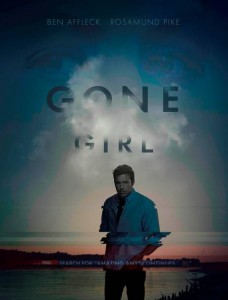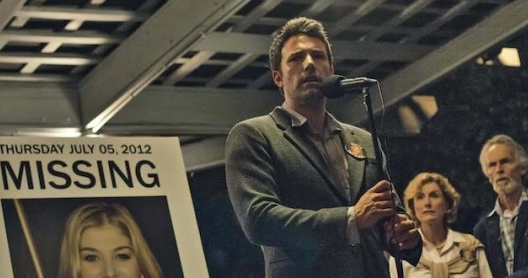‘Gone Girl’ successfully embraces its darkly comic nature
3 ½ out of 4 stars
One of the most highly anticipated films of the year, Gone Girl seemed to have a target on its back from the word “go”. Gillian Flynn’s novel shot to the top of the bestseller list quickly and screamed “film adaptation” immediately. And thanks to a precise and morosely comic screenplay (by Flynn herself) and keen direction, this thriller already has the promise to be not only a box office hit, but an instant film classic.
Nick (Ben Affleck) and Amy Dunne (Rosamund Pike) have what appears to be a perfect life. A beautiful house in a quiet neighborhood in 2012 North Carthage, Missouri. Nick owns a bar in town run by his plucky twin sister Margot (Carrie Coon). All seems right until Nick comes home one morning to find Amy gone and his living room torn apart. Now the search is on, during which we slowly discover Nick and Amy’s marriage was never quite as perfect as we thought. More importantly, we begin to wonder whether or not Nick himself is responsible for Amy’s disappearance, as Detective Rhonda Boney (Kim Dickens) and Officer Jim Gilpin (Patrick Fugit) uncover clues that point straight back to him.
 Flynn manages an incredible tightwire act as screenwriter. Her characters are incredibly intelligent without being annoying, and their varying forms of syntax give an enormous amount of detail about their backgrounds. Her sense of plot technique is completely on point, offsetting the most romantic of flashback moments with the most uneasy of current day scenes during the search.
Flynn manages an incredible tightwire act as screenwriter. Her characters are incredibly intelligent without being annoying, and their varying forms of syntax give an enormous amount of detail about their backgrounds. Her sense of plot technique is completely on point, offsetting the most romantic of flashback moments with the most uneasy of current day scenes during the search.
Flynn’s greatest achievement is her ability to make her ridiculous plot points take off thanks to a sense of fun and humor that offsets the serious nature of the central conflict. Make no mistake, this is pulp fiction at its best, and Flynn completely embraces the stretched reality and wacky quirks of her characters with a smile. But more importantly she has managed to create nuanced observations on the nature of marriage and long term relationships while weaving in commentary on the state of the media today. She has written one of the most remarkable screenplay adaptations of recent years.
Director David Fincher (Fight Club and The Curious Case of Benjamin Button) has a wide range of films to his name, but his ability to place his stamp on every piece he does stands as his greatest achievement. He manages that here as well, creating a pulpy, gritty story with a beautifully morose look and stylistically arch characters (all of which fit well into the fun and darkly funny characters Flynn has created). This is unmistakably a Fincher film. The variance lies in the details.
This piece has some of the most unique editing, creating very quick and sudden shifts within as well as out of scenes. This flash movement makes visual details poignantly superfluous and the film itself seem to fly by. Indeed, its two and a half hour running time never lags. However, this technique acts as a double edged sword and makes some scenes feel extra choppy and sit uncomfortably, like a messy Aaron Sorkin TV episode.

Fincher’s usual director of photography Jeff Cronenweth (Fight Club and The Social Network) utilizes his typically flawless tool kit here, creating a foreboding atmosphere that permeates the seemingly quiet suburbanite setting. His contrasts between scenes in and outside of North Carthage stand out and make an unmistakable miasma apparent during investigations as well as flashbacks. And Fincher’s newfound composers Trent Reznor and Atticus Ross of Nine Inch Nails Fame create an appropriate pounding electronic score that fits well into the uneasy atmosphere.
The casting runs the gamut and never ceases to fascinate. Affleck gives possibly his strongest performance to date and is a perfect choice to play Nick. His stoicism and quiet on screen give him a neutral overtone that plays well with his character’s dubious nature. Pike plays the curiosity and clinical nature of her character well, but more importantly she plays the ever changing tactics of her character with great ease and little pomp.
Tyler Perry’s stigma as a comedic actor works against him, despite his strong performance as Nick’s defense attorney. And Neil Patrick Harris similarly fits uncomfortably into the ensemble, his expressively comic face adding an uncomfortable tone to most scenes. But the lesser known faces fare much better, including Dickens in a pitch perfect performance that allows her character to anchor the ensemble. And Coon is a revelation here, managing quip after witty quip while never exceeding her dramatic boundaries.
Make no mistake, this film is disturbing. As someone who had never read the book, I found myself in shock at some of the gruesome and dark plot points Flynn had chosen. Fortunately, I enjoy dark and I enjoy dark comedy even more. If you do too, you are sure to enjoy one of the most poignant, observant, and delightfully trashy surprises this film season has to offer.

Mark McCarver was born and raised in Houston, Texas and has been involved in theater and film since he was a kid. He spent the past few years acting and directing across Texas before moving to Washington, DC in the fall of 2012 to get a taste of the East Coast’s entertainment industry. Mark holds a BA in Drama from Trinity University and trained at the Syracuse University – London Drama Program and Shakespeare’s Globe. He is a company member with Half Mad Theatre in Washington.

